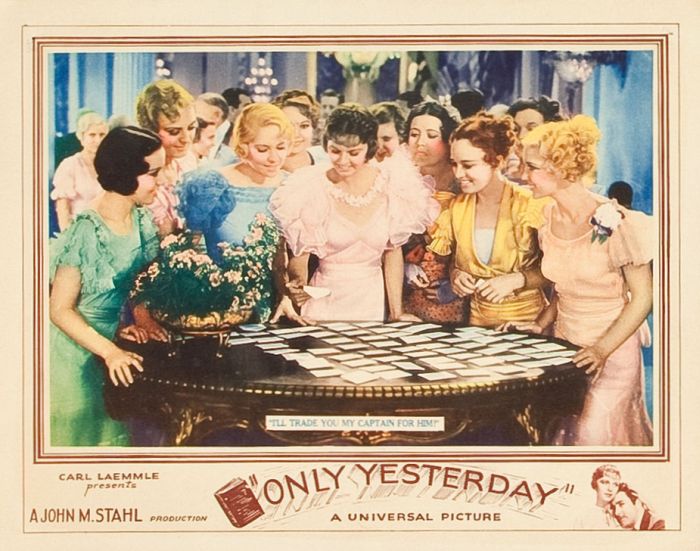I am thrilled to announce that I will be programming and hosting a unique series of six rarely-seen Universal Pictures from the 1930s next month at Quentin Tarantino’s New Beverly Theatre. From Friday to Sunday, September 20-22, I will present 35mm prints of films that, for the most part, have not been broadcast on television or made available on home video. (And, of course, they’re not streaming anywhere either.) This is a fantastic opportunity to discover some remarkable works from talented filmmakers and actors alike.

The series kicks off with George S. Kaufman and Moss Hart’s brilliant satire of early Hollywood, Once in a Lifetime (1932), featuring Aline MacMahon, Russell Hopton, and Jack Oakie. The film begins with a humorous message from Universal chief Carl Laemmle, who congratulates himself for being able to poke fun at his own industry. Following this, we’ll screen The Cohens and Kellys in Hollywood (1932), the sixth entry in the series of politically incorrect ethnic comedies starring George Sidney and Charles Murray, featuring cameo appearances by Universal contract players Boris Karloff, Lew Ayres, Gloria Stuart, and Tom Mix.

On Saturday night, we’ll feature Afraid to Talk (1932), a remarkable pre-Code film that explores political corruption in a large city, showcasing characters played by Louis Calhern, Tully Marshall, Berton Churchill (the scheming banker in John Ford’s stagecoach), and Edward Arnold. Audiences can expect stunning art deco sets and innovative cinematography, thanks to director Karl Freund, known for his work on Metropolis. This film was directed by Edward L. Cahn, who also directed Law and Order that year. I was fortunate to showcase this solid Western at the TCM Classic Film Festival, and it remains impressively compelling. Co-written by a young John Huston, it features his father, Walter Huston, portraying a stand-in for Wyatt Earp. The screenplay draws on the true events of the gunfight at the O.K. Corral, as chronicled by W.R. Burnett, the author of Little Caesar. Harry Carey co-stars in this unpretentious yet powerful film. Unfortunately, Cahn’s career declined after these two notable 1932 releases.

Sunday night features a double feature showcasing Margaret Sullavan, beginning with her debut film, Only Yesterday (1933), directed by John M. Stahl, known for his expertise in soap operas. Be prepared for an emotional ride, as Sullavan’s character is deserted by John Boles after becoming pregnant, only to be forgotten when they cross paths years later. Also on the program is The Good Fairy (1935), directed by William Wyler from a screenplay by Preston Sturges, which highlights Sullavan’s comedic talent. While this delightful film is available on DVD, I’m looking forward to experiencing it with an enthusiastic audience.

This series was inspired by a month-long tribute to “Junior” Laemmle, the son of Universal’s founder Carl Laemmle, organized by Dave Kehr at the Museum of Modern Art in New York in 2016. Some historians believe that Carl Jr. has been unfairly maligned. When he was appointed head of production in the late 1920s, his father let nepotism stand aside in favor of business. Despite facing ridicule, Junior made bold decisions that ultimately paid off, supporting filmmakers like James Whale and William Wyler (his cousin) while upholding the studio’s commitment to horror films. Regrettably, due to a series of financial troubles in 1936, the Laemmles were ousted from their own company. Junior was blamed for overspending on films that garnered critical acclaim but failed to translate into box office success.
If you are in or around Los Angeles, I strongly encourage you to take this opportunity to view beautiful prints of some overlooked films. Depending on the success of this program, I hope the New Beverly will allow me to showcase even more in the future.




